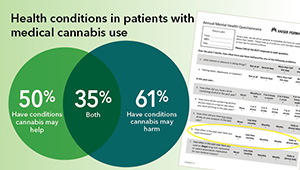Medication Use & Patient Safety
Research overview
Americans are using more prescription drugs than ever. Consequently, they’re coping with more side effects, drug interactions, and costs, especially if they’re using multiple medications. Kaiser Permanente Washington Health Research Institute (KPWHRI) scientists are on the forefront of answering questions about these concerns. We’re studying the beneficial and harmful effects of medications in real-world settings, and innovating better ways to manage and monitor drug use.
The institute contributes to national initiatives to monitor medication safety as well as providing information to help doctors and patients weigh the risks and benefits of various prescription drugs.
Funders of KPWHRI medication use and patient safety research include the Centers for Disease Control and Prevention, the U.S. Food and Drug Administration, the National Institutes of Health, the Patient-Centered Outcomes Research Institute, and other sources. A few projects include:
- Studying whether commonly used medications, including oral contraceptives, are associated with the risk of developing COVID-19 infection or severe disease
- Exploring patient and clinical risk factors for opioid misuse, abuse, and addiction
- Evaluating an intervention for patients taking long-term high-dose opioids to successfully taper their use without negatively impacting pain management and quality of life
- Proactive monitoring of medical products through the FDA Sentinel Initiative
- Studying medication safety for pregnant people and older adults
- Monitoring vaccine safety and effectiveness
- Investigating how medications affect risk of cognitive decline and dementia in late life
- Reaching out to inform patients and providers about the risks of, and alternatives to, commonly used medications that may contribute to falls, including over-the-counter antihistamines
Recent publications on Medication Use & Patient Safety
Dublin S, Walker RL, Gray S, Hubbard RA, Anderson ML, Yu O, Montine TJ, Crane PK, Sonnen JA, Larson EB. Use of analgesics (opioids and nonsteroidal anti-inflammatory drugs) and dementia related neuropathology in a community-based autopsy cohort. J Alzheimers Dis. 2017;58(2):435-448. doi: 10.3233/JAD-160374. PubMed
Hart R, Veenstra DL, Boudreau DM, Roth JA. The impact of body mass index and genetics on warfarin major bleeding outcomes in a community setting. Am J Med. 2016 Sep 1. pii: S0002-9343(16)30860-9. doi: 10.1016/j.amjmed.2016.08.017 [Epub ahead of print]. PubMed
Thielke S, Shortreed SM, Saunders K, Turner JA, LeResche L, von Korff M. A prospective study of predictors of long-term opioid use among patients with chronic non-cancer pain. Clin J Pain. 2016 Jul 15. [Epub ahead of print]. PubMed
Morris C, Paul K, Safranek S. Procalcitonin-guided antibiotic therapy for acute respiratory infections. Am Fam Physician. 2016 Jul 1;94(1):53-8. No abstract available. PubMed
Pawloski PA, Asche SE, Trower NK, Bergdall AR, Dehmer SP, Maciosek MV, Nyboer RA, O'Connor PJ, Sperl-Hillen JM, Green BB, Margolis KL. A substudy evaluating treatment intensification on medication adherence among hypertensive patients receiving home blood pressure telemonitoring and pharmacist management. J Clin Pharm Ther. 2016 Jun 30. doi: 10.1111/jcpt.12414. [Epub ahead of print]. PubMed
Researchers in Medication Use & Patient Safety
 David E. Arterburn, MD, MPHSenior Investigator |
 Jennifer F. Bobb, PhDSenior Biostatistics Investigator |
 Jessica Chubak, PhDSenior Investigator |
 Andrea J. Cook, PhDSenior Biostatistics Investigator |
 Maricela Cruz, PhDAssociate Biostatistics Investigator |
 Sascha Dublin, MD, PhDSenior Investigator |
 Laurel Hansell, MA, MPHCollaborative Scientist |
 Laura Harrington, PhD, MPHAssociate Investigator |
 Noorie Hyun, PhDAssociate Biostatistics Investigator |
 Lisa A. Jackson, MD, MPHSenior Investigator |
 Rita Mangione-Smith, MD, MPHExecutive Director and Senior Investigator, KPWHRI; Vice President for Research and Health Care Innovation, Kaiser Permanente Washington |
 Jess Mogk, MPHCollaborative Scientist |
 Jennifer C. Nelson, PhDDirector, Biostatistics; Senior Investigator |
 Gaia Pocobelli, PhDSenior Collaborative Scientist |
 Susan M. Shortreed, PhDSenior Biostatistics Investigator |
 Rod L. Walker, MSPrincipal Collaborative Biostatistician |
 Paige D. Wartko, PhD, MPHSenior Collaborative Scientist |
 Robert D. Wellman, MSPrincipal Collaborative Biostatistician |
 Karen Wernli, PhDSenior Investigator |
 Brian D. Williamson, PhDAssociate Biostatistics Investigator |
 Onchee Yu, MSPrincipal Collaborative Biostatistician |
 Weiwei Zhu, MSPrincipal Collaborative Biostatistician |
Affiliate researchers
Susan Heckbert, MD, PhD
University of Washington (UW) Department of Epidemiology; UW Cardiovascular Health Research Unit
David Siscovick, MD, MPH
UW Department of Medicine; UW Department of Epidemiology; UW Cardiovascular Health Research Unit
Leslie Spangler, PhD
Amgen















